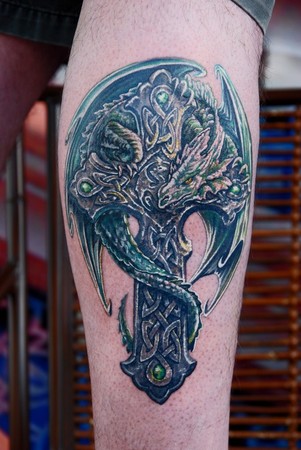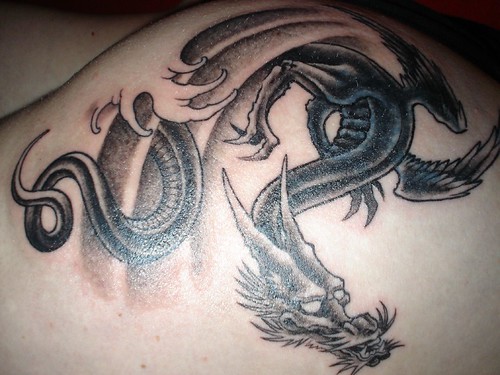 The Celtic Cross and Shamrock are two such designs that have survived the test Therefore the early tattoo designs of the Picts evolved over time and blended with Christian beliefs to form what we know of as Celtic artwork today. A great deal of this work was saved by the Christian monks in the "Books Of Kells" which is today housed at Trinity College in Ireland. This was done in order to bridge the gap between the Druid beliefs and those of the Christians.
The Celtic Cross and Shamrock are two such designs that have survived the test Therefore the early tattoo designs of the Picts evolved over time and blended with Christian beliefs to form what we know of as Celtic artwork today. A great deal of this work was saved by the Christian monks in the "Books Of Kells" which is today housed at Trinity College in Ireland. This was done in order to bridge the gap between the Druid beliefs and those of the Christians.At the same time the monks adopted many of the active Celtic beliefs, and symbols into the Christian religion. Once the first Christian missionaries arrived to the British Isles they established written communication within the Celtic culture. The Celts didn't have a printed language and alternatively communicated their customs and beliefs by word of mouth. Celtic artwork and symbolism embodied a mix of Druid and Christian religions.
The designs created by the Picts began to have a mysterious religious and symbolic significance. Later on, they began to using a blue pigment derived from the leaves of a native plant. Just about all historians think that the Picts tattooed themselves by puncturing their skin with red-hot tools to produce complex and permanent artwork on their body. It's thought that Celtic tattoo designs trace their origins back to a clan that inhabited the British Isles called the Picts.
They are oftentimes done in blackened color with lots of shading and the symbols used are intricate and beautiful. It is no secret why these are so popular. Celtic tattoos have become a favorite design choice. There's been a growing interest in tattoos lately,and Celtic tattoo designs are no exception.






No comments:
Post a Comment